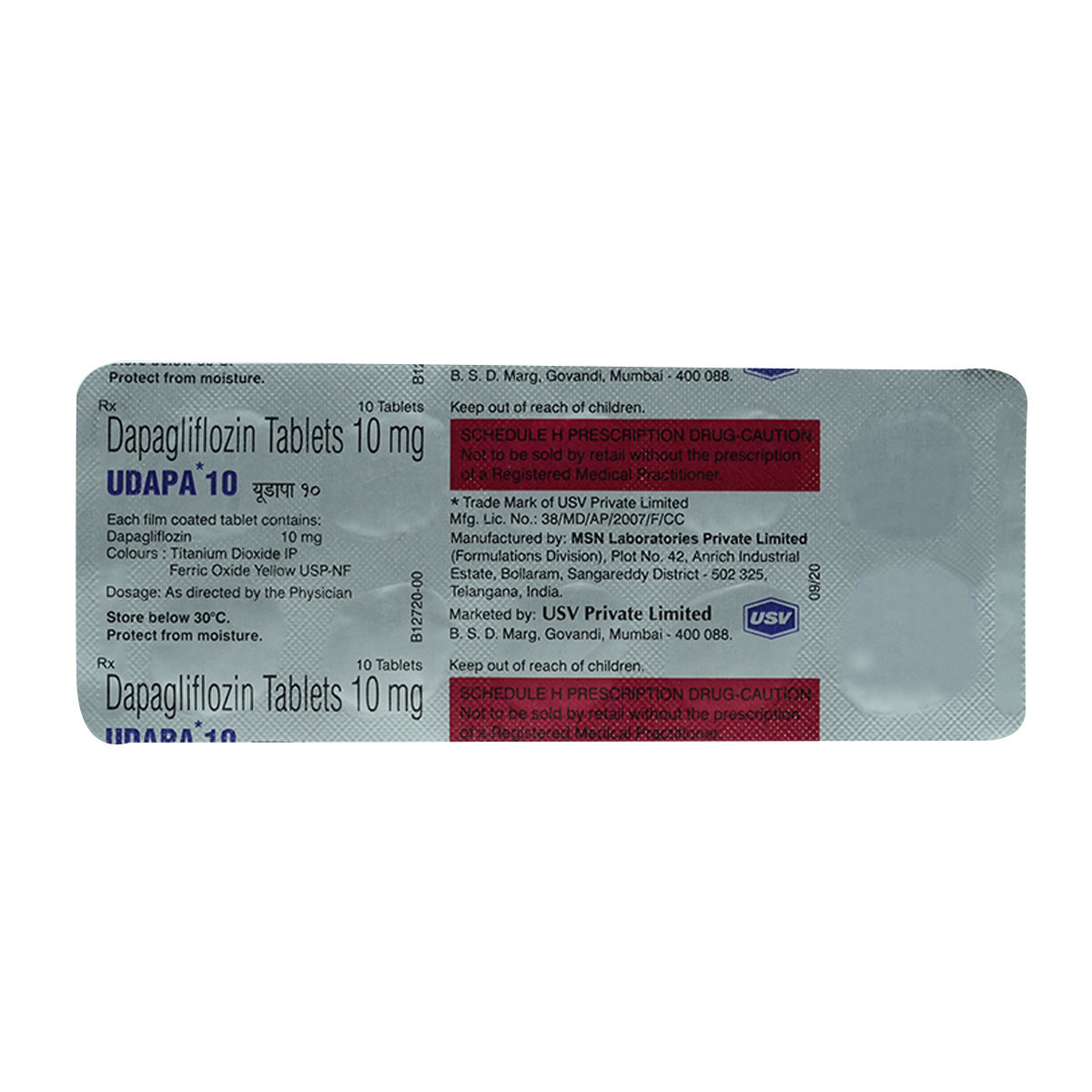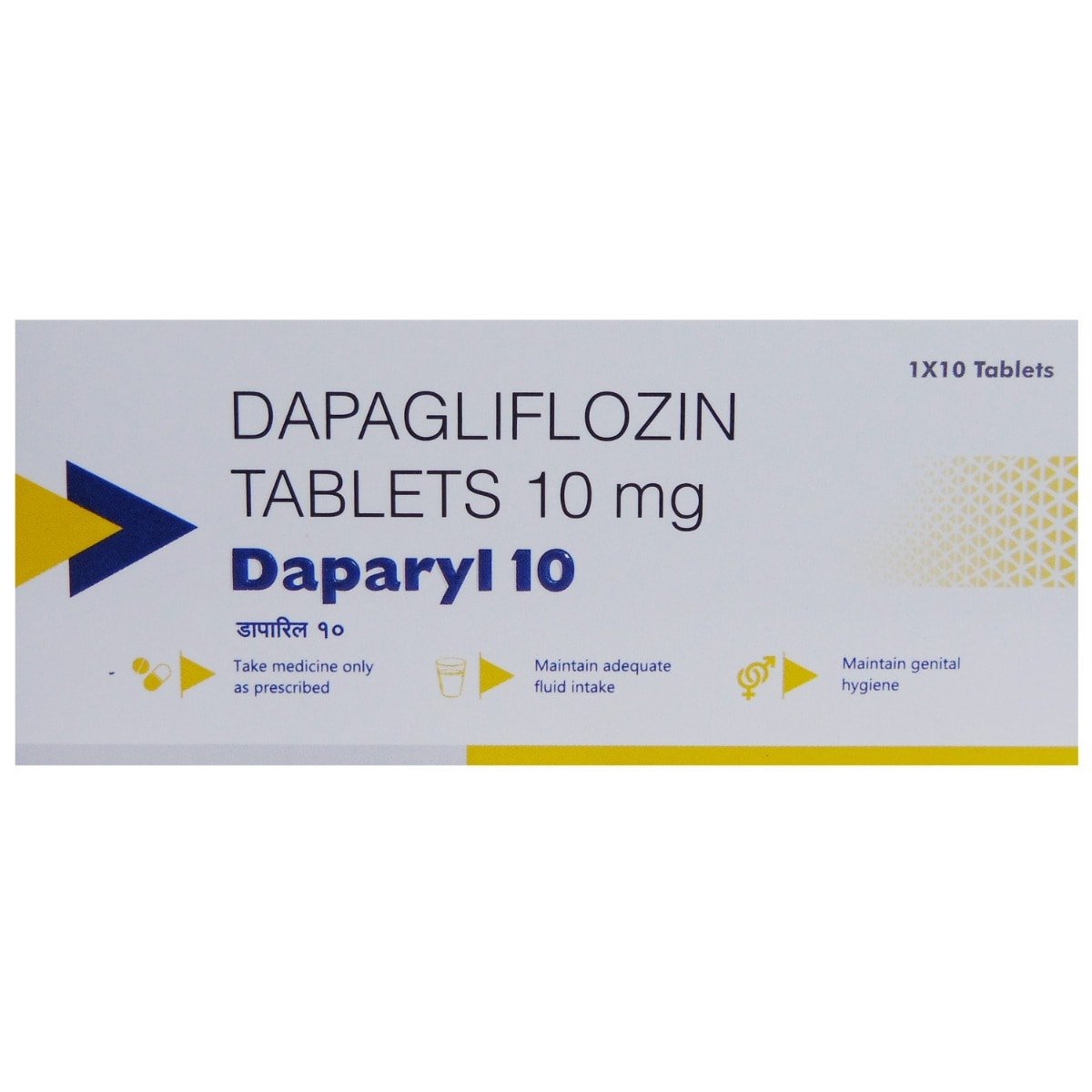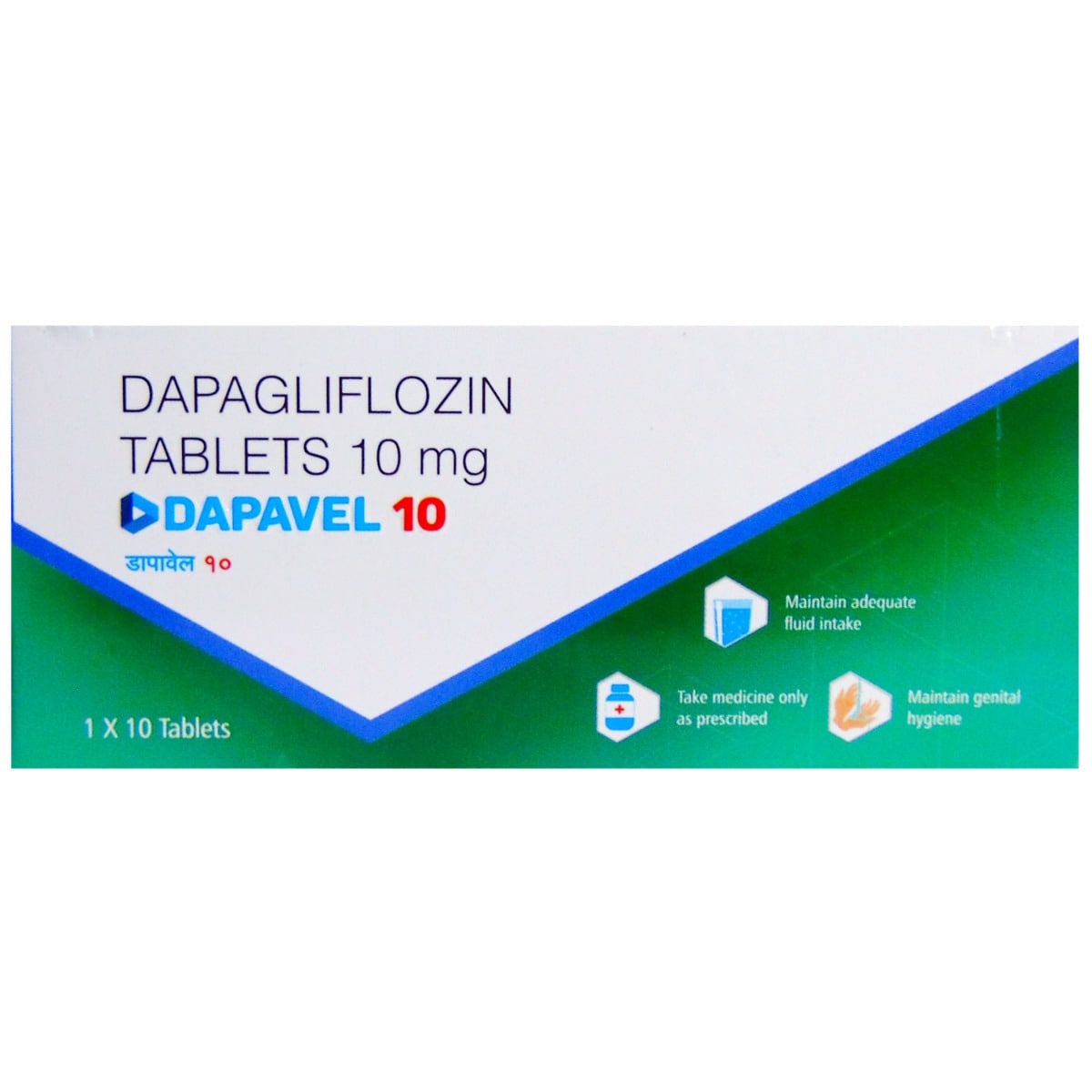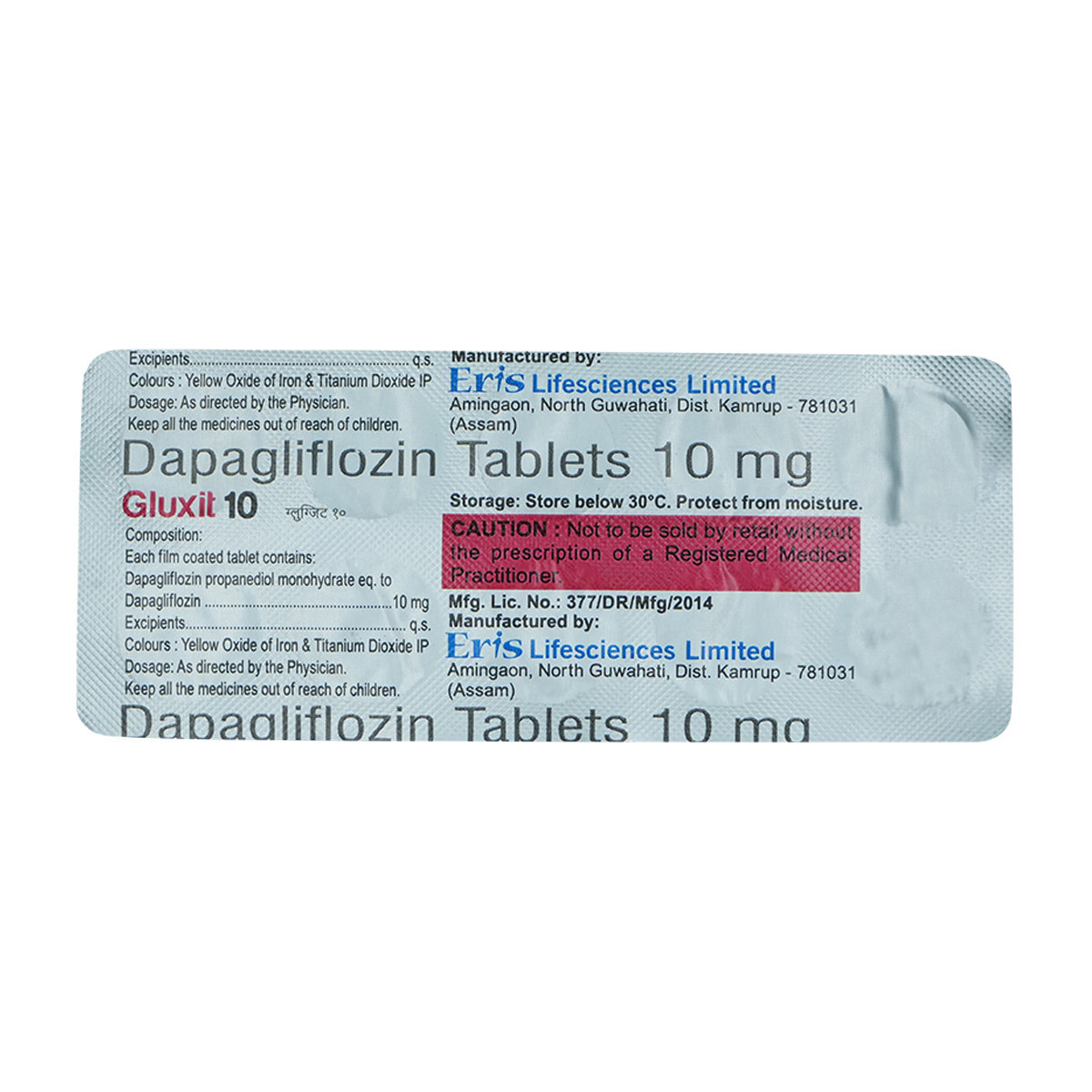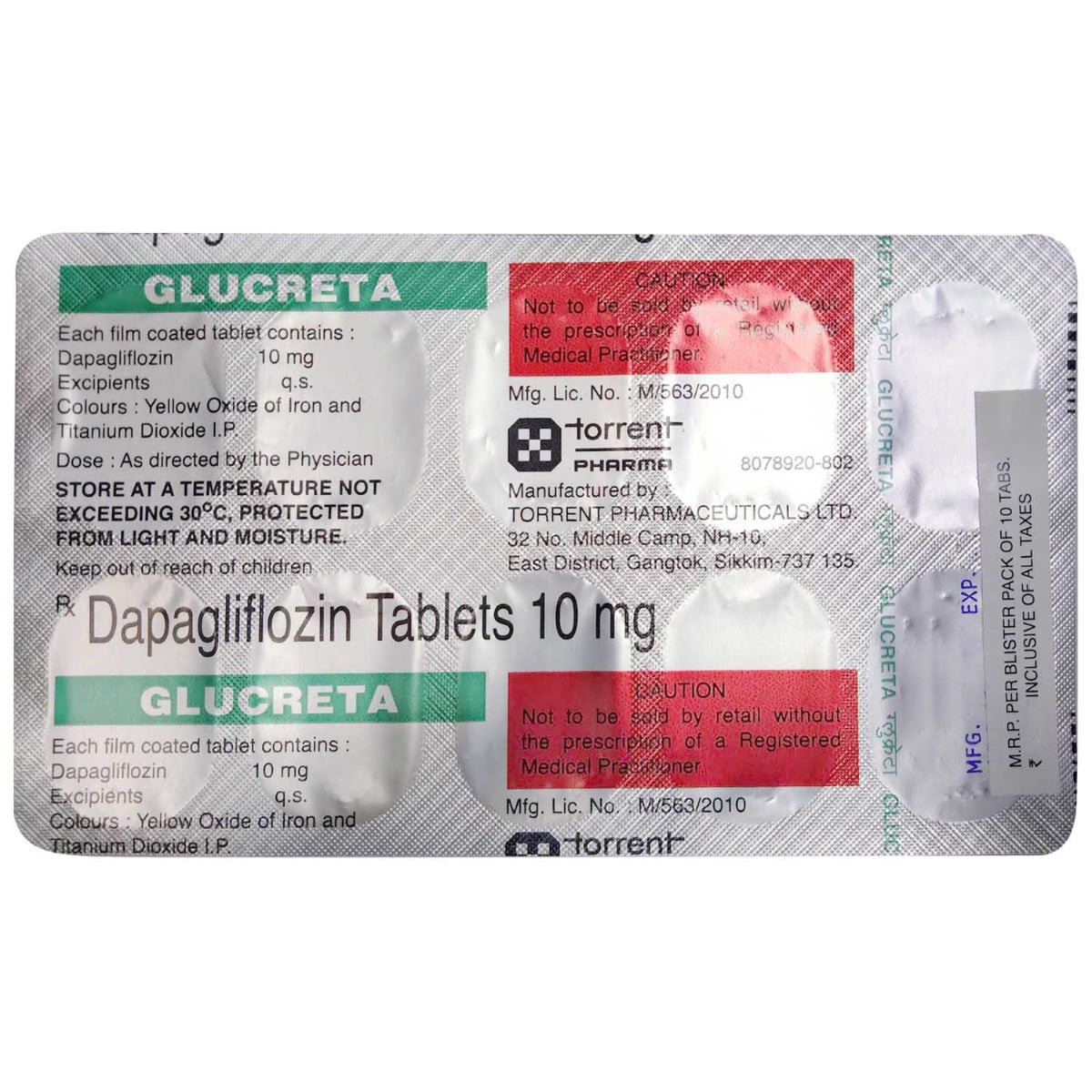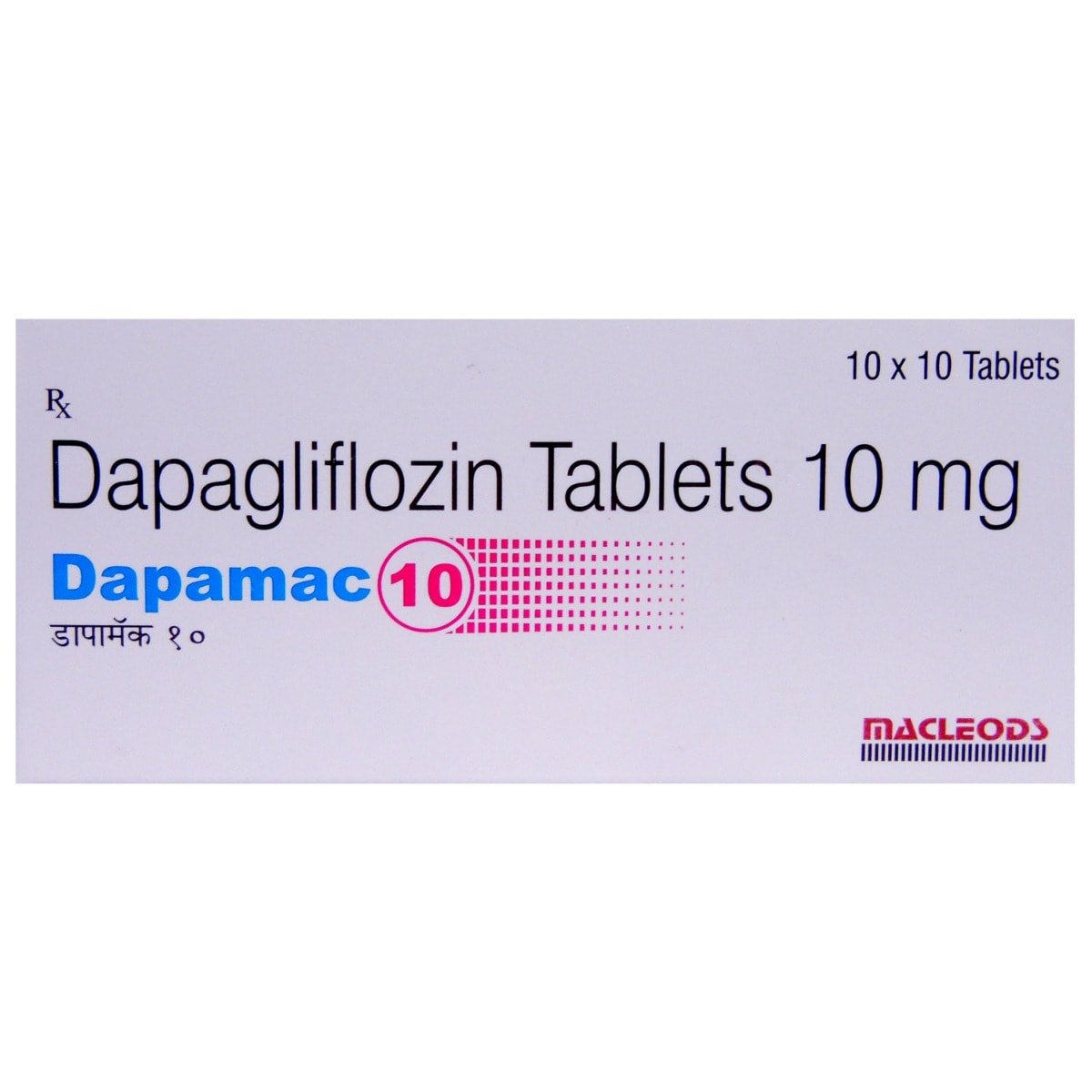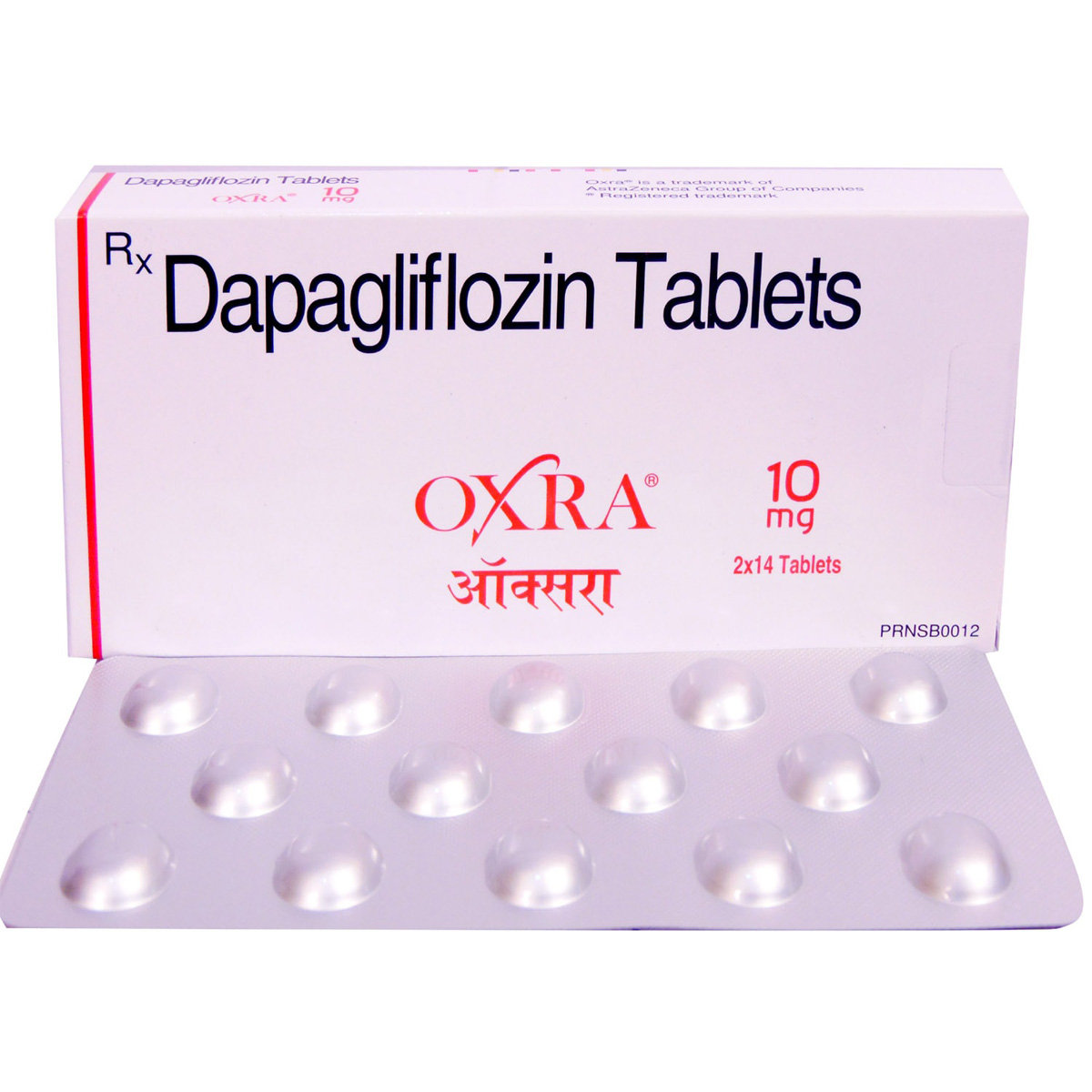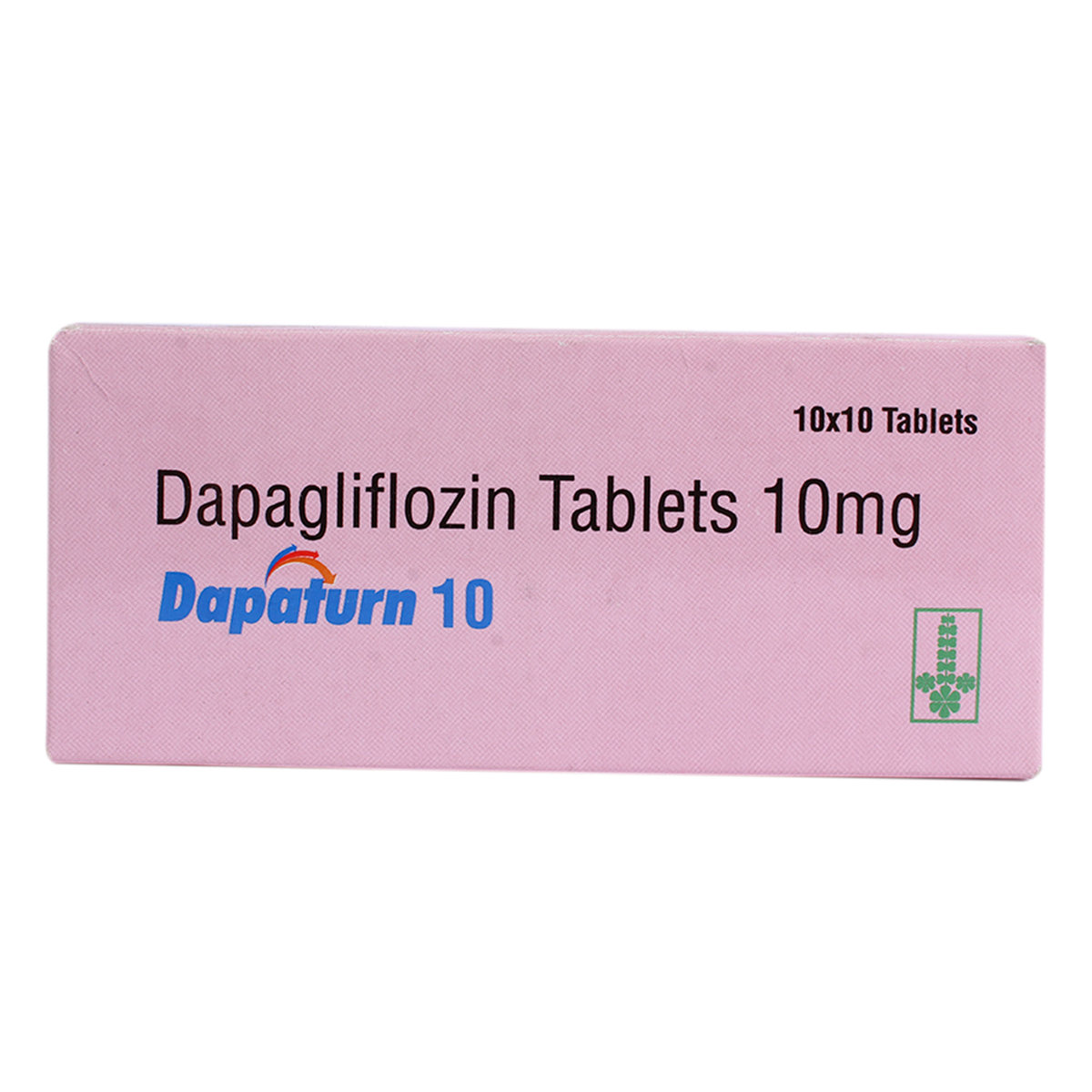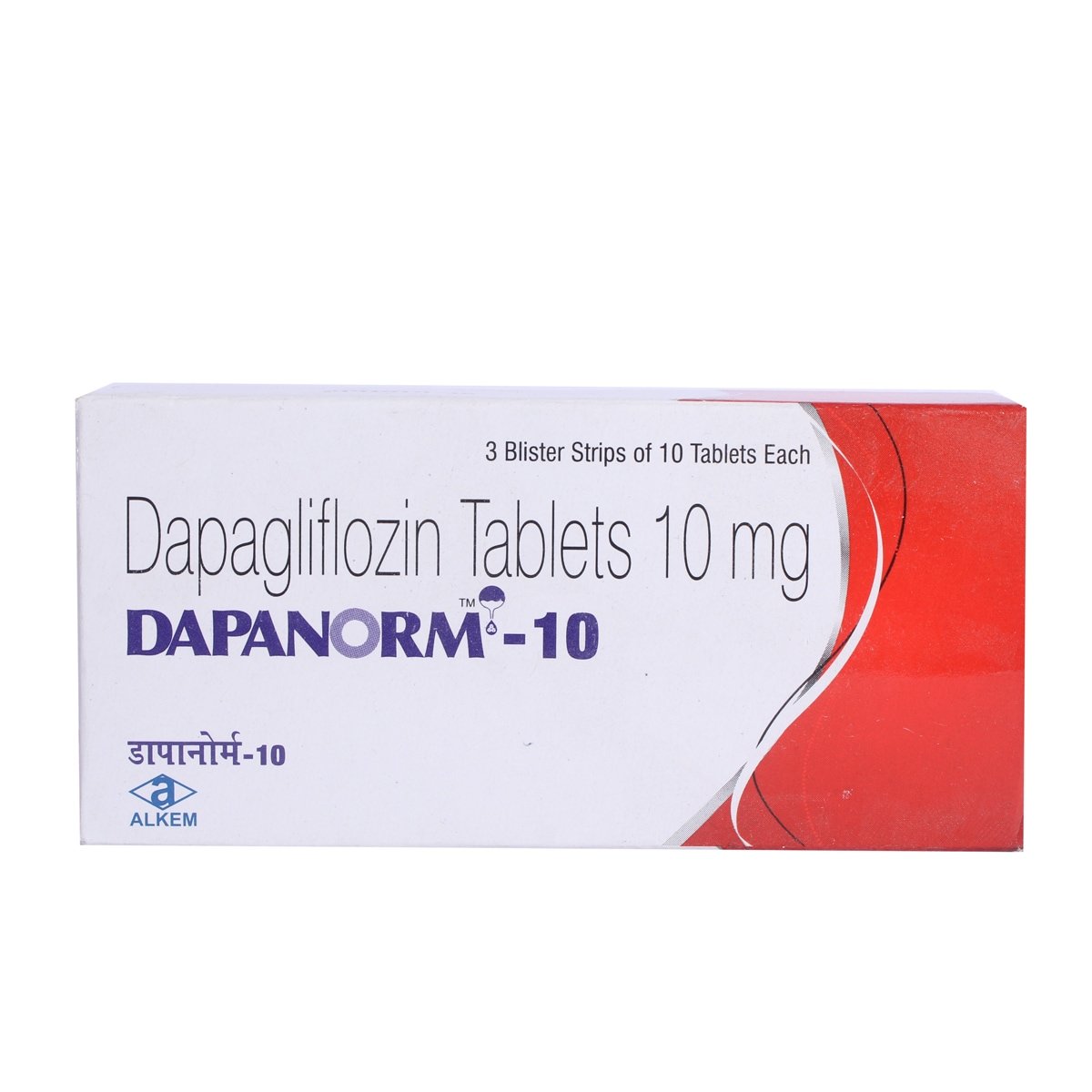Dapagrav 10 Tablet 10's
MRP ₹141.5
(Inclusive of all Taxes)
₹21.2 Cashback (15%)
Provide Delivery Location
Online payment accepted
 Prescription drug
Prescription drugWhats That
Composition :
Manufacturer/Marketer :
Consume Type :
Return Policy :
About Dapagrav 10 Tablet 10's
Dapagrav 10 Tablet 10's belongs to the category of medicines called 'anti-diabetic' primarily used for the management and treatment of type 2 diabetes. Type 2 diabetes is a condition that occurs when there is either less insulin or available insulin is not properly utilized by our body cells for lowering raised blood glucose. It is the most common type of diabetes, accounting for around 90% of total diabetes cases found commonly in middle-aged people. So it is also called adult-onset diabetes or non-insulin-dependent diabetes mellitus (NIDDM).
Dapagrav 10 Tablet 10's contains 'Dapagliflozin' a protein found in kidney known as sodium-glucose cotransporters-2 (SGLT-2 inhibitor) that works by inhibiting the reabsorption of glucose in the body, resulting in an increase in glucose excretion through urine. The removal of excessive glucose helps to lower down the blood sugar level.
Take Dapagrav 10 Tablet 10's as prescribed. Your doctor will recommend you how often you take Dapagrav 10 Tablet 10's based on your medical condition. In some cases, you may experience urinary tract infection, low blood sugar levels (hypoglycemia), peeing more than normal, skin rash, dizziness, increased thirst, Nausea. Most of these side effects of Dapagrav 10 Tablet 10's do not require medical attention and gradually resolve over time. However, if the side effects are persistent, reach out to your doctor.
If you are hypersensitive to any of the components present in these medicines, please tell your doctor before taking it. Dapagrav 10 Tablet 10's is not allowed to use in children below 18 years of age. If you are a woman who is pregnant or breastfeeding or planning to be pregnant, then tell your doctor before they prescribe this medicine to you. Dapagrav 10 Tablet 10's, when used with diuretics, may increase the risk of dehydration, kidney problems and lower blood pressure. Let your doctor know if you are taking any other medication. Do not take or stop Dapagrav 10 Tablet 10's if the doctor did not advise you to do so. Limit your alcohol consumption with Dapagrav 10 Tablet 10's as alcohol may cause a rapid increase or decrease in blood sugar levels.
Uses of Dapagrav 10 Tablet 10's
Directions for Use
Key Benefits
Dapagrav 10 Tablet 10's belongs to the anti-diabetic drug category, indicated in the treatment of type 2 diabetes or non-insulin-dependent diabetes (NIDDM). This medicine is primarily prescribed to persons whose blood sugar levels are high and not controlled by diet and exercise alone. Dapagrav 10 Tablet 10's consists of “Dapagliflozin” a sodium-glucose cotransporter-2 (SGLT-2) inhibitor responsible for inhibiting SGLT-2 enzymes in the kidney. Thus, it prevents the reabsorption of glucose from the blood filtered through your kidney, thereby increasing the glucose excretion from your body when you urinate.
Storage
- If you experience low blood sugar levels, inform your doctor. They will assess the severity and make recommendations for the next actions.
- Your doctor will assess your symptoms, blood sugar levels, and overall health before recommending the best course of action, which may include treatment, lifestyle modifications, or prescription adjustments.
- Follow your doctor's instructions carefully to manage the episode and adjust your treatment plan.
- Make medication adjustments as recommended by your doctor to prevent future episodes.
- Implement diet and lifestyle modifications as your doctor advises to manage low blood sugar levels.
- Monitor your blood sugar levels closely for patterns and changes.
- Track your progress by recording your blood sugar levels, food intake, and physical activity.
- Seek further guidance from your doctor if symptoms persist or worsen so that your treatment plan can be revised.
- Painful urination can be reduced by drinking lots of water.
- Don't hold urine, as it can worsen the pain during urination.
- Try taking probiotics and eating garlic, which can help reduce painful urination.
- Sleep well and give enough rest to your body.
- Take a balanced diet and avoid bladder-irritating foods.
- Quit smoking and intake of alcohol.
- Practice yoga and meditation to improve inner strength and stay healthy.
- Vaginal yeast infections need immediate medical attention.
- Eat healthy foods like whole grains, lean protein and probiotics.
- Keep your blood sugar levels in the medium range, which can help reduce the risk of yeast infections.
- Wash your vulva well to prevent contamination, and after using the toilet, wipe from the front to prevent the spread of infection.
- Avoid tight-fitting clothes as they may increase moisture and heat in the affected area. Ensure to use cotton underwear only.
- Frequently change pads or tampons and always keep the effects dry.
- Avoid sprays, perfumes and deodorants in the vaginal area, as they can change the normal balance of organisms in the vagina.
- Include lifestyle modification by normalising body weight and intake of a balanced diet.
- Follow healthy patterns that are good for heart and reduce the fat level in your body.
- Contact your doctor and follow the prescribed course for a speedy recovery.
- Quit smoking and avoid intake of alcohol which can worsen the situation.
- High levels of phosphate in the blood need immediate medical attention.
- Get a physical examination and blood tests to identify factors causing high phosphate levels to manage the outcomes.
- Avoid consuming phosphate rich foods like egg yolks, soft drinks, milk, chocolate etc.
- Talk to your dietician and consume foods which can maintain ideal phosphorus levels.
- Maintain a healthy weight and implement good habits to prevent stress and anxiety.
Drug Warnings
Tell your doctor if you are allergic to Dapagrav 10 Tablet 10's and other medicines, have severe kidney disease, high ketone levels in blood or urine, heart disease, congestive heart failure, liver disease or you are using insulin or other oral diabetes medications. Dapagrav 10 Tablet 10's, when used with other diabetes medications, may extremely lower the blood sugar level leading to hypoglycemia condition, which can be fatal. Your doctor may adjust the dose by lowering the dose of other diabetes medicine or Dapagrav 10 Tablet 10's in this case. A person should keep taking Dapagrav 10 Tablet 10's even if they are feeling that their blood sugar levels are under control as it may again spike the level of sugar in the blood. You should take small frequent meals and don't fast while being treated with Dapagrav 10 Tablet 10's. Try to notice if you are developing the symptoms of hypoglycemia (low blood sugar) like sweating, dizziness, dry mouth, dry skin, palpitations, shivering, intense thirst, frequent urination. If you notice any of the mentioned symptoms, then immediately take honey/sugar candies and consult with a physician.
Drug-Drug Interactions
Drug-Drug Interactions
Login/Sign Up
Co-administration of Dapagrav 10 Tablet with Gatifloxacin may sometimes affect blood glucose levels. Both low blood glucose and, less frequently, high blood glucose have been reported.
How to manage the interaction:
Although there is a possible interaction, Gatifloxacin can be taken with Dapagrav 10 Tablet if prescribed by the doctor. Consult the prescriber if you experience symptoms such as nervousness, confusion, headache, dizziness, drowsiness, tremor, nausea, hunger, weakness, perspiration, palpitation, rapid heartbeat, increased urination, increased thirst, and increased hunger. Maintaining blood glucose levels is advised. Do not discontinue the medication without consulting a doctor.
Co-administration of Dapagrav 10 Tablet with Aliskiren may increase the risk of dehydration and low blood pressure.
How to manage the interaction:
If you are supposed to use Dapagrav 10 Tablet and Aliskiren together, a doctor may adjust the dose and monitor you more frequently. However, if you experience dizziness, fainting, headache, lightheadedness, and/or changes in pulse or heart rate, contact a doctor. Do not discontinue the medication without consulting a doctor.
Drug-Food Interactions
Drug-Food Interactions
Login/Sign Up
Diet & Lifestyle Advise
- Fill your half plate with starchy veggies, a quarter with proteins and a quarter with whole grain.
- Eat at regular intervals. Do not take a long gap between a meal or snack.
- Monitor your blood sugar level regularly, especially when there are lots of fluctuations.
- Invest at least 150 min of moderate-intensity physical activity or one hour and 15 minutes of high-intensity exercise every week.
- Lose weight gradually to achieve a healthy body mass index (18.5 to 24.9).
- Replace refined carbohydrates containing whole-grain foods and increase the intake of fruits and veggies and other fiber-enriched foods.
- Reduce intake of saturated fat (or hidden fats) in food like chips, crisps, pastries, biscuits and samosas. Choose omega 3 fatty acid-containing oils for daily cooking. You can use palm oil, mustard oil, groundnut oil, rice bran oil and safflower oil for frying.
- Do not take stress as it may elevate your blood sugar level. You can adopt stress management techniques like mindfulness to control stress-related blood sugar changes.
- Opt for low-fat dairy products (low-fat yogurt, fat-free milk, and cheese, etc.).
- Keep your blood pressure as normal (120/80) as possible as it reduces the risk of cardiovascular diseases in diabetes patients.
Side Effects of Dapagrav 10 Tablet 10's
- Urinary tract infection
- Low blood sugar levels (hypoglycemia)
- Frequent urination
- Skin rash
- Dizziness
- Increased thirst
- Nausea
Habit Forming
Therapeutic Class
All Substitutes & Brand Comparisons
RX
Cipdapla 10 Tablet 10's
Cipla Ltd
₹103
(₹10.3 per unit)
27% CHEAPERRX
Udapa 10 Tablet 10's
USV Pvt Ltd
₹141.5
(₹12.74 per unit)
9% CHEAPERRX
Dapefy 10 Tablet 14's
Sun Pharmaceutical Industries Ltd
₹203
(₹13.05 per unit)
7% CHEAPER
Author Details
We provide you with authentic, trustworthy and relevant information
Drug-Diseases Interactions
Drug-Diseases Interactions
Login/Sign Up
Use caution when using Dapagrav 10 Tablet in individuals with severe hepatic impairment. Patients with mild or moderate hepatic impairment do not require dosage modifications.
How to manage the interaction:
Dapagrav 10 Tablet should be used with caution in patients with liver impairment.
In patients with deteriorating renal function, the glucose-lowering effects of SGLT2 inhibitors are reduced. Acute kidney damage and hypotension are side effects with volume depletion are common in patients with renal impaired function, the elderly, and those using loop diuretics. It is not recommended to use SGLT-2 inhibitors in dialysis patients.
How to manage the interaction:
Dapagrav 10 Tablet is contraindicated in patients undergoing dialysis.
After the start of treatment, SGLT-2 inhibitors promote intravascular volume contraction, which may result in symptomatic hypotension, particularly in the elderly, in patients with impaired renal function, in patients with low systolic blood pressure, or in patients using diuretics. Monitor volume status.
How to manage the interaction:
Blood plasma volume should be assessed and corrected before starting treatment with Dapagrav 10 Tablet, and patients should be monitored during therapy.
The use of sodium-glucose cotransporter 2 inhibitors may cause increased risk of genital mycotic infections. When administering this medication to patients who have a history of genital mycotic infections, caution should be taken. Monitor closely.
How to manage the interaction:
Dapagrav 10 Tablet should be used with caution in patients who have a history of genital mycotic infections (fungal infections of the urogenital area) or who are uncircumcised, as these patients are more likely to develop genital mycotic infections.
FAQs
Dapagrav 10 Tablet 10's is a type of medicine known as a sodium-glucose cotransporter-2 (SGLT2) inhibitor used in the treatment of type 2 diabetes. It lowers blood sugar levels by blocking the action of SGLT-2 in the kidney and remove excess sugar from your body through urine.
In case you feel that your blood sugar level is going down and you are feeling weak, immediately eat sugar candies or drink sugary beverages. It will help to balance the blood sugar level in your body. So, it is advisable to keep sugar candies with you.
Dapagrav 10 Tablet 10's can cause weight loss by increasing the amount of sugar that is removed from your body when you pee. Consult your doctor before starting Dapagrav 10 Tablet 10's.
No, a person should continue taking Dapagrav 10 Tablet 10's as much a doctor has prescribed for the treatment of type 2 diabetes. You should not stop discontinuing Dapagrav 10 Tablet 10's suddenly as it may worsen the symptoms of type 2 diabetes and increase the blood sugar level leading to hyperglycemia.
Type 2 diabetes is a common form of diabetes in which the blood sugar-lowering hormone called insulin produced by the body does not function properly. Thus, the blood glucose level increases and symptoms such as frequent urination, increased thirst and increased hunger start. Diabetes, if left untreated or not treated properly, can cause long-term complications such as nerve damage, kidney damage, eye damage, foot problems and poses a high risk of developing heart diseases.
Dapagrav 10 Tablet 10's can cause risk in pregnancy and affect the fetus. Please consult your doctor before starting Dapagrav 10 Tablet 10's.
Your driving ability may be affected if your blood sugar levels are too high or too low. Do not drive or operate machinery if you also experience dizziness or drowsiness.
Yes, using Dapagrav 10 Tablet 10's may cause urinary track infections in few people, so always practice good hygiene.
Drug-Drug Interactions Checker List
- FUROSEMIDE
- AMILORIDE+HYDROCHLOROTHIAZIDE
- BACLOFEN
- TAMSULOSIN
- LEVODOPA
- GATIFLOXACIN
- AMLODIPINE
- BISOPROLOL
- GLIMEPIRIDE
- GLIPIZIDE
Special Advise
- You should have a test of glycated hemoglobin (HbA1c) every 3 months to check your blood glucose level control.
- Drink plenty of fluids as use of Dapagrav 10 Tablet 10's may cause dehydration.
Disease/Condition Glossary
Type 2 diabetes: It is a chronic or life-long condition in which cells of the body fail to respond to insulin and in later stages, the body even fails to produce enough amount of insulin. It comprises around 90% of total diabetes cases. This condition makes the body rely on different energy sources in muscles, tissues and organs. This disease develops gradually, and the early symptoms include constant hunger, lack of energy, fatigue, weight loss, excessive thirst, frequent urination, dry mouth, itchy skin and blurry vision. Persons who are middle-aged or older are most possibly have type 2 diabetes, so it is also called adult-onset diabetes. The risks of uncontrolled type 2 diabetes include damaged retina of eyes or blindness, loss of limbs, nerve problems, kidney problems, sexual dysfunction and increase the possibility of heart attack or stroke.

Have a query?
Alcohol
Safe if prescribed
You should avoid consuming alcohol with Dapagrav 10 Tablet 10's as it may lead to high or low blood sugar levels.
Pregnancy
Consult your doctor
Dapagrav 10 Tablet 10's is a Category C pregnancy drug that is not recommended for pregnant women or given only under strict guidance of the doctor as there is no clinical data available on use in pregnant women.
Breast Feeding
Consult your doctor
There is no sufficient data on how Dapagrav 10 Tablet 10's affects breastfeeding. It is safe to seek medical advice before you start Dapagrav 10 Tablet 10's if you are lactating.
Driving
Safe if prescribed
Drive only if you are physically stable and mentally focused, if you experience drowsiness after taking these medications, you should not drive or operate any machinery or vehicles.
Liver
Consult your doctor
Take Dapagrav 10 Tablet 10's only after the doctor's prescription, especially if you are dealing with Liver diseases/conditions as your doctor may adjust the dose as required.
Kidney
Consult your doctor
Take Dapagrav 10 Tablet 10's after the recommendation of a doctor, especially if you have a history of Kidney diseases/conditions. The dosing strength needs to be adjusted by your doctor as required.
Children
Safe if prescribed
The use of Dapagrav 10 Tablet 10's is not recommended for children below 18 years.





